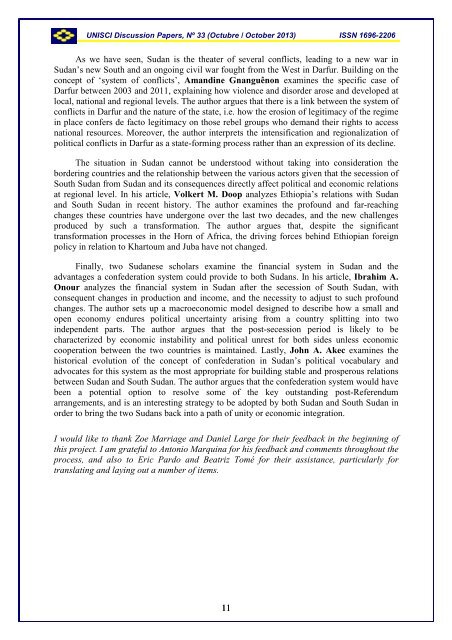UNISCI - Universidad Complutense de Madrid
UNISCI - Universidad Complutense de Madrid
UNISCI - Universidad Complutense de Madrid
Create successful ePaper yourself
Turn your PDF publications into a flip-book with our unique Google optimized e-Paper software.
<strong>UNISCI</strong> Discussion Papers, Nº 33 (Octubre / October 2013) ISSN 1696-2206As we have seen, Sudan is the theater of several conflicts, leading to a new war inSudan’s new South and an ongoing civil war fought from the West in Darfur. Building on theconcept of ‘system of conflicts’, Amandine Gnanguênon examines the specific case ofDarfur between 2003 and 2011, explaining how violence and disor<strong>de</strong>r arose and <strong>de</strong>veloped atlocal, national and regional levels. The author argues that there is a link between the system ofconflicts in Darfur and the nature of the state, i.e. how the erosion of legitimacy of the regimein place confers <strong>de</strong> facto legitimacy on those rebel groups who <strong>de</strong>mand their rights to accessnational resources. Moreover, the author interprets the intensification and regionalization ofpolitical conflicts in Darfur as a state-forming process rather than an expression of its <strong>de</strong>cline.The situation in Sudan cannot be un<strong>de</strong>rstood without taking into consi<strong>de</strong>ration thebor<strong>de</strong>ring countries and the relationship between the various actors given that the secession ofSouth Sudan from Sudan and its consequences directly affect political and economic relationsat regional level. In his article, Volkert M. Doop analyzes Ethiopia’s relations with Sudanand South Sudan in recent history. The author examines the profound and far-reachingchanges these countries have un<strong>de</strong>rgone over the last two <strong>de</strong>ca<strong>de</strong>s, and the new challengesproduced by such a transformation. The author argues that, <strong>de</strong>spite the significanttransformation processes in the Horn of Africa, the driving forces behind Ethiopian foreignpolicy in relation to Khartoum and Juba have not changed.Finally, two Sudanese scholars examine the financial system in Sudan and theadvantages a confe<strong>de</strong>ration system could provi<strong>de</strong> to both Sudans. In his article, Ibrahim A.Onour analyzes the financial system in Sudan after the secession of South Sudan, withconsequent changes in production and income, and the necessity to adjust to such profoundchanges. The author sets up a macroeconomic mo<strong>de</strong>l <strong>de</strong>signed to <strong>de</strong>scribe how a small andopen economy endures political uncertainty arising from a country splitting into twoin<strong>de</strong>pen<strong>de</strong>nt parts. The author argues that the post-secession period is likely to becharacterized by economic instability and political unrest for both si<strong>de</strong>s unless economiccooperation between the two countries is maintained. Lastly, John A. Akec examines thehistorical evolution of the concept of confe<strong>de</strong>ration in Sudan’s political vocabulary andadvocates for this system as the most appropriate for building stable and prosperous relationsbetween Sudan and South Sudan. The author argues that the confe<strong>de</strong>ration system would havebeen a potential option to resolve some of the key outstanding post-Referendumarrangements, and is an interesting strategy to be adopted by both Sudan and South Sudan inor<strong>de</strong>r to bring the two Sudans back into a path of unity or economic integration.I would like to thank Zoe Marriage and Daniel Large for their feedback in the beginning ofthis project. I am grateful to Antonio Marquina for his feedback and comments throughout theprocess, and also to Eric Pardo and Beatriz Tomé for their assistance, particularly fortranslating and laying out a number of items.11
















